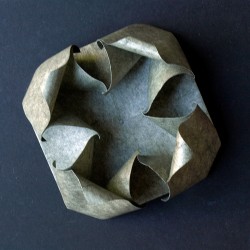40 (7/22): Two leaves (Fall)
August 18, 2011
 These two leaves look the same as those in Four leaves. However, here the pleats in each are parallel to the orientation of the folded leaf, while originally they were perpendicular to it. The center of the sheet is where the two leaves meet, and the twist does two things: it changes the color by flipping the visible side of the paper, and it shapes the leaves by pressing all the pleats tightly together. Pins (nails) are critical in shaping this.
These two leaves look the same as those in Four leaves. However, here the pleats in each are parallel to the orientation of the folded leaf, while originally they were perpendicular to it. The center of the sheet is where the two leaves meet, and the twist does two things: it changes the color by flipping the visible side of the paper, and it shapes the leaves by pressing all the pleats tightly together. Pins (nails) are critical in shaping this.
39 (7/21): Little boxes
August 18, 2011
38 (7/20): Curling
August 18, 2011
37 (7/19): Four squares
August 18, 2011
36 (7/18): Scream
August 18, 2011
 Just like the previous variation, this fold gets really really thick in places, and when the paper is as thick as elephant-hide, the effect is quite different.
Just like the previous variation, this fold gets really really thick in places, and when the paper is as thick as elephant-hide, the effect is quite different.
35 (7/17): Burgeoning
August 18, 2011
 Another reworking of an idea from 2008. This time, I used moriki kozo with no sizing. The sheet was probably about 8 inches square. In both cases, my goal was to do in paper something reminiscent of Božena Štih-Balen (especially the Burgeoning series, shown in the second row on the third page of the portfolio). I still have work to do here, but for this series I’m happy with a few variations (see also days 36 and 43).
Another reworking of an idea from 2008. This time, I used moriki kozo with no sizing. The sheet was probably about 8 inches square. In both cases, my goal was to do in paper something reminiscent of Božena Štih-Balen (especially the Burgeoning series, shown in the second row on the third page of the portfolio). I still have work to do here, but for this series I’m happy with a few variations (see also days 36 and 43).
34 (7/16): Unfolding
August 18, 2011
33 (7/15): Waterwheel
August 18, 2011
 This was inspired by a revisit to something I did back in 2008. Instead of a simple three by three grid of identical wavelets, I added twists during the folding so that the one in the middle tilts in a different direction. I refolded a version of this recently and as I was working on it I thought about the logical continuation of the idea: use more than two orientations. In fact, use all four! It took four or five attempts before I got the folding sequence right. Tant, 12 by 12 inches, 24-base grid.
This was inspired by a revisit to something I did back in 2008. Instead of a simple three by three grid of identical wavelets, I added twists during the folding so that the one in the middle tilts in a different direction. I refolded a version of this recently and as I was working on it I thought about the logical continuation of the idea: use more than two orientations. In fact, use all four! It took four or five attempts before I got the folding sequence right. Tant, 12 by 12 inches, 24-base grid.





